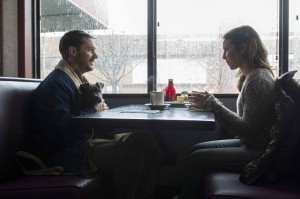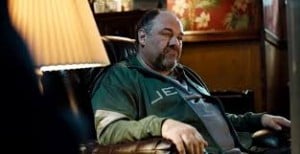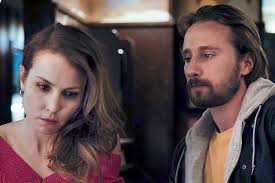
For enthusiasts of the smart television renaissance that began in the 1990’s, the acting and writing talent joined in The Drop represents an ideal pairing. James Gandolfini, in his last major role, plays the closest facsimile of his Tony Soprano character since that series ended in 2007. And The Drop’s screenplay author, the esteemed suspense novelist Dennis Lehane, penned episodes for one of HBO’s other masterworks, The Wire.
The Drop’s action centers around a blue collar Brooklyn bar. Its manager, Marv (Gandolfini), pines for his glory days as a feared and respected leader in local organized crime. At present, however, he must merely, discontentedly permit his establishment to serve as a money drop for Chechen thugs who’ve displaced him. His calm and nonjudgmental cousin Bob Saginowski (Tom Hardy) tends bar nightly and endures Marv’s sniping over his charity towards deadbeat patrons.
Marv and Bob’s routine breaks when a pair of stickup men steals $5000 belonging to the Chechens, who then insist ominously that Marv must reimburse them for their losses. Meanwhile, Bob rescues a pit bull dumped in a trashcan by abusive neighborhood sociopath Eric Deeds and starts falling for Deeds’ ex-girlfriend Nadia.

I’ll halt here, plot-wise, to keep this review spoiler-free. Instead, allow me to simply state that, in an era of formulaic, shootout-heavy crime movies, Lehane richly satisfies with a easygoing pace that only gradually ratchets up the intensity, until the final half-hour creates that delightful discomfort that only the best craftspeople can induce in their readers or viewers. Additionally, Lehane tosses in a few hefty twists that surprised me, yet in retrospect make sound storytelling sense based on the preceding deft characterizations and foreshadowing.
The Drop is Belgian-born director Michael R. Roskam’s first U.S. release and his second feature film overall. I’ve not seen his previous movie Bullhead, but from the reviews I’ve read, it revealed significant skill and promise, yet was muddled and overly busy in its narrative. The Drop by contrast unspools cleanly, with effective use of a dark visual palette and a nicely edited mix of close-ups and medium shots. With its unglamorous Brooklyn scenery and believable working class interiors, it calls to mind the manner in which The Sopranos and The Wire effectively situated themselves in suburban New Jersey and poor Baltimore neighborhoods, respectively.

Roskam coaxes quality performances from all his key players, too. With each year since Inception, Tom Hardy has grown ever more versatile, whether portraying a Batman supervillain, or, as is the case here and in the very good Locke, a more ordinary fellow faced with personal moral crises. Noomi Rapace admittedly has less to do here as the wary yet fundamentally decent Nadia; while Matthias Schoenaerts, superlative as a dense yet decent chap opposite Marion Cotillard in 2012’s Rust and Bone, excels again, this time as the skin-crawlingly ubiquitous bad guy Eric Deeds.

Gandolfini, too, showed decent range in the past few years, whether as the CIA Director in Zero Dark Thirty or a divorced empty nester in last year’s charming Enough Said. In The Drop, he revealed yet again his knack for depicting compromised characters who still manage to elicit empathy. Marv strongly resembles a Tony Soprano who’s faced a decade-long recession. In this case, though, instead of propping up the affluent lifestyle of his wife and kids, he’s overwhelmed by medical bills for a gravely ill parent.
Lastly, I would be remiss if I failed to mention The Drop’s philosophical and religious undercurrents. Lehane’s novels commonly incorporate a Roman Catholic backdrop for their lamentations over the moral, social, and economic decline of American cities. The Drop picks up where Lehane’s books leave off. Bob Saginowski faithfully attends Mass every morning, yet for reasons initially unclear to us, consistently declines to partake of the Eucharist. He also elects to name his rescued pit bull Rocco, after the patron saint of dogs (and the wrongly accused!).

Detective Torres, a comparably devout cop, shadows Saginowski while trying to solve the bar stickup case and notices him at Mass. Torres wryly comments that their church has been purchased by a real estate developer and will soon be turned into condos. The implication here, as in The Wire and Lehane’s Boston-based Kenzie/Gennaro detective stories, seems to be that, in the absence of honest employment opportunities and effective rule of law, our cities have developed a spiritual vacuum at their core. While I may disagree with Lehane and Roskam’s choice of iconography, I will not dispute their ultimate moral conclusion.
4 out of 5 stars
(Parent’s guide: The Drop earned its R rating for violence and strong language. I would feel comfy allowing my middle teens to view it.)












